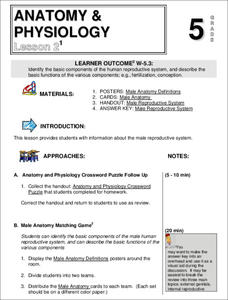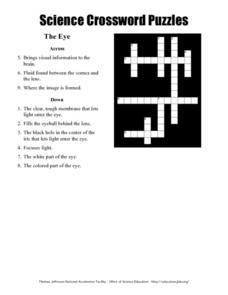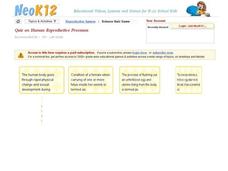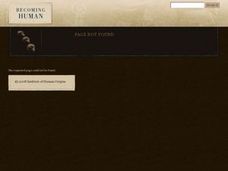Curated OER
Levers and Wedges in the Human Body
Learners identify the various parts of the body that serve as wedges and levers, identifying the fulcrum for each body lever. They bite into carrots and apples to analyze how their jaws and teeth work, then complete three worksheets that...
Curated OER
Freshwater Fish Anatomy & Taxonomy
Tenth graders use a classification key to identify organisms. In this classification lesson students identify freshwater species of fish and document their observations.
Curated OER
Anatomy of a Bone - Coloring
Clarify and color code the anatomy of a bone with this resource. This worksheet lists 7 parts of a bone along with a definition for each part. Learners read through this information and color in each part of the bone a listed color. They...
Curated OER
Who Wants to Be a Millionaire: The Heart
Using an interactive game, learners can explore information relating to the human heart. This would be the perfect way to have students review information learned about the human body. The presentation could be altered for use with a...
Ask a Biologist
Neuron Anatomy Activity
Reinforce the neural connections in the brains of your young biologists with a simple anatomy activity. Looking at the provided diagram of a neuron, students are asked to correctly identify and describe the function of each of the six...
Curated OER
Home: Where the Heart Is
If you're looking for copious background information to support study of the human heart, here it is! You can find photos of hearts, and text about the development, structure, systems, and monitoring that support heart function. Also...
Curated OER
Art: Go Ahead and Bug Me!
Students research arthropods, and identify the differences between vertebrates and invertebrates. After comparing and contrasting insects and arachnids, they create drawing of them that are anatomically correct. Students place their...
Curated OER
Rainbow Trout
Students investigate the many varieties of both tropical and freshwater fish, and find out about the anatomy of these creatures. They explore biodiversity in bodies of water, including information about coral reefs, and study the effects...
Curated OER
Draw Inside The Human Body
Students engage in a lesson that is concerned with the drawing of the anatomy of the human body. They conduct research using a variety of resources and create a drawing on the ground with sidewalk chalk. Students also view models of the...
Curated OER
Seed Sensations!
First graders examine seeds. In this Science lesson, 1st graders classify and dissect seeds. Students sprout their own seeds in the classroom.
Curated OER
Anatomy- Excretory System
Fourth graders explore, analyze and identify the structures and order the process of the excretory system through a model or a diagram. They assess the names and locations of the organs involved in the excretory process, as well as...
Curated OER
Coral Polyp Party
Students complete a project where they label the parts of a coral polyp and discuss the differences between plants and animals. Students use marshmallows, sprinkles, toothpicks, and more to label their coral polyp.
Curated OER
Anatomy and Physiology
Fifth graders investigate the male sexual anatomy. Each part is discussed in detail with lecture from the teacher. The topic of circumcision is also covered and it helps to promote cultural diversity. The internal functions of the penis...
Curated OER
Roots: The Ancestry of Modern People
High schoolers investigate the models for the origin of modern humans and the conditions that facilitate speciation and evolution. The classification and nomenclature of hominid species is also examined.
Curated OER
Science Crossword Puzzles: The Ear
Employ this crossword puzzle as a review activity for ear anatomy. Pupils use 8 clues about the anatomy of an ear to solve the puzzle. Answers are not included with this worksheet; however, since there are only 8 words, it should be...
Curated OER
Science Crossword Puzzles: The Eye
The focus of this crossword puzzle is the anatomy of the eye. Using 9 clues, puzzlers fill in the spaces provided. If your class is working on the eye, this could be used as a quick in-class or homework review on anatomy. Answers are not...
Curated OER
Human Reproductive Processes Quiz
Quiz your learners on the reproductive process using this terminology assessment tool! Choose 1 of 2 options: have students play online, or make copies of the paper version. The advantage to playing the online matching game is its...
Curated OER
ESL: Body Parts Matching
Match drawings of basic body parts with their names. A handy tool for teachers of beginning ELLs.
Curated OER
Introduction To Anatomy Quiz
Test your class on anatomy vocabulary words with this quiz. Pupils identify various parts of the human body by choosing the correct term for each given description. This is a basic multiple choice quiz with 10 questions. Class members...
Curated OER
Anatomy of the Texas Brown Tarantula
Investigate arachnid anatomy with this worksheet. Using the provided drawing, class members label 7 anatomy parts of the Texas Brown tarantula. If your class is just learning anatomy, you might provide a word bank of anatomical parts....
Curated OER
Insect Anatomy
Break down insect anatomy with this worksheet! Class members diagram insect anatomy by drawing a line from the names of grasshopper body parts to the corresponding parts on an image of a grasshopper. The worksheet provides the word bank...
Curated OER
Building Bodies
Students identify key anatomical similarities and differences between great apes and humans. They infer likely anatomical features in ancient human ancestors and list principal anatomical changes in primates necessary for adaptation to...
Curated OER
Art and Anatomy: The Vitruvian Teen
Twelfth graders create an artistic version of a Vetruvian teen. For this anatomy lesson, 12th graders design an experiment to test the theory of the ideally proportioned man. They present their findings in class.
Curated OER
Cardiovascular Disease and Fitness: Exploring the Rhythm of Your Pulse
Students explore several examples of cardiovascular diseases. In this anatomy lesson, students explain why physical fitness is very important. They count their pulse rate and record them on a data table.

























